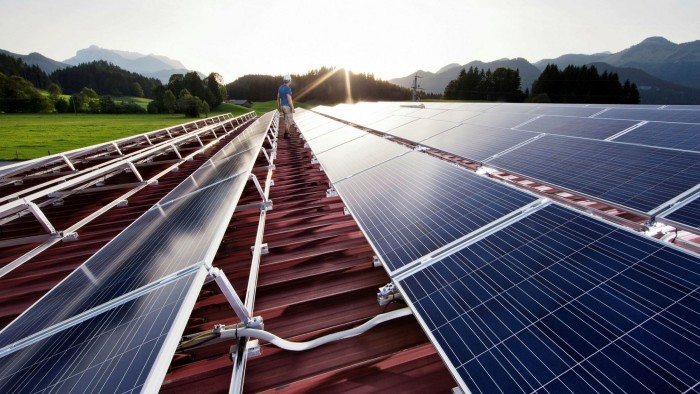Austria pushes green enterprise credentials

Roula Khalaf, Editor of the FT, selects her favourite stories in this weekly newsletter.
When the Green Party entered a coalition government with the Austrian People’s party in 2020, reforming tax and benefits to the advantage of green, sustainable businesses was a centrepiece of the administration’s agenda.
The country hoped to push its credentials as a top European hub for green enterprise, while putting Austria on a path towards becoming carbon-neutral by 2040 — 10 years earlier than the EU’s stated goal.
But then came the Covid pandemic, as well as domestic political instability, including the resignation of Sebastian Kurz as chancellor in October, following allegations of misuse of public funds (Kurz has denied any wrongdoing and no charges have been brought).
Despite this, however, the country has continued on its green path. And, while its ambitions to overtake Germany have not yet been realised, Austria can point to progress in becoming a hub for green enterprise, focused on sustainability and reducing carbon emissions.
“Where we consider ourselves among Europe’s top-tier countries, apart from in female entrepreneurship, is in the vast number of green start-ups,” says Kambis Kohansal Vajargah, head of start-up services at the Austrian Federal Economic Chambers.
“Over two-thirds of all start-ups pursue ecological goals and focus on sustainable business models.”
According to the Austrian Chamber of Commerce, the Austrian green tech sector generated sales of more than €15bn in 2019 and employed more than 50,000 people.
Those numbers could now grow significantly. Austria’s recovery and resilience plan — part of the EU-wide pandemic recovery programme — is heavily focused on sustainability, with about 59 per cent of money allocated to measures supporting climate objectives.
In early October, the country announced tax measures that included a phased-in tax on carbon emissions, which will see CO2 emissions taxed at €30 per ton starting from July 2022, gradually rising to €55 a ton by 2025.
“We have united to give carbon-dioxide emissions a price,” finance minister Gernot Blümel said at the time.
Also as of October, Austrians can use all nationwide public transport for just €1,095 a year — the equivalent of €3 a day — as part of an effort to significantly decarbonise the economy by getting more cars off the roads.
Policies like these, while not enough for many activists, could help to stimulate green enterprises in the country. Those operating in the green tech sector say the building blocks are in place.
“Austria, just like Germany and Scandinavia, started early in climate action, and therefore we have pioneers that grew over the last 20 years to a good strength,” says Bernhard Puttinger, managing director of the Green Tech Cluster, a hub of about 250 companies and research institutions focused on green initiatives that are based near Graz, in Styria.
Puttinger says the country now has about 20 global tech leaders in green businesses, and points to a clear focus in the future on areas such as the energy transition and e-mobility. “The potential for Austria is there,” he argues. “I think this coalition is showing that you can reduce carbon emissions and still grow the economy.”
Cornelia Habacher, co-founder of Vienna-based start-up Rebel Meat, which creates sustainable meat products, says more money is being invested in green enterprise, and that there is often additional funding available for those who can show a green agenda.
“There’s a very green focus right now,” she says. “I think it’s shifted a lot in the last two years especially.”
The recent political crises in Austria could help to push through further change as, until recently, it was Kurz’s People’s party that largely dominated the governing coalition — often at the expense of the Green party’s policy agendas.
“The Green party base had to swallow a lot when it came to these judicial allegations and investigations,” says Thomas Hofer, a prominent political consultant. “They had to swallow a lot when it came to migration, social affairs. Now, I think the Greens might get more and more self confident. If you look at recent polls, for the first time they have the option, if it came to early elections, of a three-party coalition with the Social Democrats and the NEOs [The New Austria and Liberal Forum]. They have leverage.”
If that is the case, many will be hoping that they can use it to push through further changes that will help the country become a hub for green enterprise.
“We have to make ambitious goals, that’s the only way to achieve them,” says Christoph Grimmer, co-founder and chief executive of EET, an Austrian start-up making solar energy systems that can be installed on balconies. He points out that one of the country’s targets is to have all electricity from renewable sources by 2030, up from 81 per cent in 2020, which was already the highest proportion in the EU.
“Even if we miss that by a year or two, it is still a good achievement,” he says. “The framework is pretty much there, but it’s more like the mindset that needs to grow across the country.”
Climate Capital

Where climate change meets business, markets and politics. Explore the FT’s coverage here.
Are you curious about the FT’s environmental sustainability commitments? Find out more about our science-based targets here
Comments